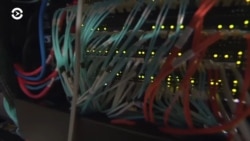The Kremlin’s efforts to set up a firmer hold on the Russian Internet got a boost on November 1 when a law went into effect that outlines the steps for creating a “sovereign Internet.”
It was promulgated in the name of cyber-security, but skeptics fear it could mean yet another cyber-crackdown.
The legislation, passed this spring, was proposed by lawmaker Andrei Lugovoi, a former Federal Security Service operative accused of playing a role in the 2006 fatal poisoning of ex-FSB officer Aleksandr Litvinenko in London.
In an interview with Current Time, Lugovoi claimed that the law will “create a system that will provide for Internet safety” and develop “a more effective system for blocking traffic” deemed a threat to state security.
By 2021, equipment capable of DPI (Deep Packet Inspection) will be installed at Internet traffic exchanges to monitor traffic and to restrict access to content Russian media regulators, Roskomnadzor, deem “dangerous.” The equipment is currently being tested in Russia’s Urals region.
Like Lugovoi, Russian President Vladimir Putin has stated that the measures are needed to help strengthen Russia against cyberattacks from foreign states and to guarantee the Russian-language Internet can function if the U.S. decides to restrict access to U.S.-based root servers.
One Internet expert interviewed by Current Time, however, rejected that logic, pointing out that root servers are located around the world.
Other critics claim that the law will only further restrict Russians’ online civil liberties, particularly in regard to foreign-sourced information.
This summer, regulators started trying to block Virtual Private Networks, which allow for anonymous browsing. In 2018, a court blocked the popular messaging service Telegram after the company refused to hand over its encryption keys to the FSB. The social-media site LinkedIn was blocked in 2016 for not storing data about Russian citizens on Russian servers.
In a 2018 ranking by Washington, DC-based rights monitor Freedom House, Russia ranked 67th out of 100 countries for Internet liberties. The country’s position has been in decline for six years in a row.






Facebook Forum